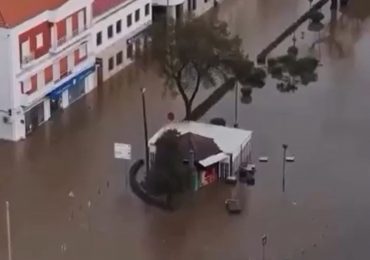THE destructive deluge that engulfed Dubai on Tuesday could end up costing the glitzy city $1billion to clean up after the “apocalyptic” floods.
The torrential downpours left airports submerged underwater, roads at a standstill and homes and businesses filled up with water as the cost of the damages begin to ramp up.
ReutersHomes have been left surrounded by deep water as many residents face an expensive few weeks fixing all the issues caused by the floods[/caption]
ReutersA recovery truck draining some of the floodwater away as Dubai waits for the true extent of the damage to be revealed[/caption]
AFPBusinesses have already had to take drastic measures as the floods wreck havoc[/caption]
ReutersResidents have been forced to get around using boats as cars have been abandoned on the streets[/caption]
For Dubai, a years worth of rain fell in just 24-hours leaving the city woefully unprepared in infrastructure and flood prevention systems.
With the water only just beginning to clear up, Dubai is finally getting on the move again.
Billionaire businesses are desperate to reopen and recoup their losses from almost 100-hours worth of disruption but the clean up is going to continue to take its toll for a while longer, according to experts.
Insurance Insider reported the worrying prediction saying their sources have pointed to damages potentially costing up to $1billion.
This whopping figure is expected to take into account commercial damages for businesses and severe repair work needed on homes, cars and soaked stores.
It is also expected that the United Arab Emirates leadership will look to pump some of their own money into flood-proofing major cities.
As they look to avoid being left swimming around for solutions in the future if another flood happens.
UAE’s President Sheikh Mohammed bin Nahyan sent out a public order calling for “authorities to quickly work on studying the condition of infrastructure throughout the UAE and to limit the damage caused”.
Dubai’s kingpins are already set to embrace for the seismic costs it’ll take to return the millionaire’s playground back to normal.
Gary Hemming, an financial expert from ABC Finance also told The Sun: “Looking at the economic impact of the torrential rains in Dubai, it’s crucial to consider several factors to estimate the potential costs of the cleanup and recovery process.
“These factors include infrastructure repair, business interruptions, and personal property losses.”
Hemming has claimed that similar catastrophic events have cost countries billions in the past.
“While the exact figures will depend on comprehensive assessments, it’s plausible to expect that the economic impact of the flooding in Dubai could be substantial, potentially exceeding several billion dollars,” he continued.
“Historically, similar events have resulted in cleanup and recovery costs running into the billions of dollars.”
Back in 2007, Cyclone Gonu became the strongest cyclone on record in the Arabian Sea and caused a reported $4.2million in damages.
The forecast is looking up for Dubai in the coming days but the clean up operations are only beginning as roads and businesses remain crippled.
Employees have been told to work from home until they can safely go in again and schools have been shut across the state.
Damning pictures show drenched cars left abandoned on the roadside and homes almost half full with water.
Terrified residents have even shared shocking footage of Dubai malls collapsing under the water pressure and metro stations shut for good.
Caroline Seubert, 29, from the UK, was with her husband at a shopping centre when the storm hit.
She told the BBC: “The mall was flooded, ceilings were collapsing. We were told to leave, but the metro was shut and the taxis were not running.
“We were stranded, had to sleep in the mall lobby overnight.”
INSURANCE SURGE
Insurance losses alone could be “in the mid-hundred-million-dollar range”, according to Insurance Insider.
Hemming was also concerned over how the floods might affect claims going forward for both civilians and the insurance companies.
Less than 15 per cent of people living in the UAE are thought to have home insurance, according to reports by The National News.
In the UK, around 75 per cent of people have at least some form of home insurance in place.
GettyMany businesses in Dubai have been forced to close in recent days leaving them missing out on cash[/caption]
ReutersParts of Dubai are still flooded today[/caption]
GettyDubai has come to a standstill after the floods ravaged the glitzy city[/caption]
Cars have been left abandoned in the floods many without insurance
Some of the main reasons why UAE residents don’t get insurance is thought to be because of the rarity of things going wrong in the luxury Gulf State.
Flooding is almost unprecedented in the UAE with them even deploying cloud seeding operations throughout the year to manufacture their own rain supply.
Andrea McNulty, head of product development at finance comparison site Yallacompare, told The National News people trying to take out insurance has surged since Tuesday.
Anthony Cerchiai, head of general insurance at Nexus Insurance, says his company found a similar increase.
He said any type of insurance “has not been popular” in the Middle East including home and medical payments.
RECORD BREAKING FLOODS
The glitzy city has come to a standstill as a years worth of rainfall fell in 24-hours in Dubai.
The torrential rain and flooding in Dubai in particular has submerged an airport, swamped malls and train stations and left Dubai paralysed with one person dead.
It has been the heaviest rain ever recorded and wiped out the millionaire’s playground.
Planes were seen swimming in floodwater at the world’s busiest airport, Dubai International, as flights were diverted through yesterday afternoon and evening.
Dramatic pictures and videos showed shopping centres swamped and busy roads resembling rushing rivers dotted with halted cars.
People trudged through ankle-deep water in a metro station, and on roads as they attempted to push their flooded cars to higher ground.
It is a historic weather event, greater than any previously recorded in Dubai, where data collection began in 1949, according to state-run WAM news agency.
Twenty-one outbound and 24 inbound flights were cancelled at Dubai International Airport (DXB) on Tuesday, while many other flights were diverted to neighbouring airports.
DXB was still badly affected on Wednesday due to “very challenging conditions”.
They are still running a limited service as of Friday morning.
By the end of Tuesday, 5.59 inches of rainfall had soaked Dubai in just 24 hours.
Schools across the UAE were largely shut yesterday and government employees, and other workers, urged to work remotely if able – both on Tuesday and again on Wednesday.
Tanker trucks worked in the streets and highways to pump away water, as flooding reached peoples homes and forced them outside.
What caused the heavy rain in Dubai?
A DELUGE of rain flooded Dubai on Tuesday, leaving at least one person dead and causing major disruption at the world’s busiest airfield.
The true cause of the heavy rain is not yet known, but some have theorised it may have been the result of cloud seeding.
Cloud-seeding is carried out in the UAE to increase the desert nation’s dwindling and limited groundwater supply, according to AP.
The weather modification technique involves small planes flying through clouds while burning special salt flares that can increase precipitation.
Meteorologists at the National Centre for Meteorology said they flew six or seven cloud-seeding flights before the rains commenced, according to reports.
And flight-tracking data analysed by the AP reportedly showed that one aircraft affiliated with the UAE’s cloud-seeding efforts flew around the country on Sunday.
A lack of drainage on roads and in other areas of the UAE – due to the irregularity of rain – is believed to have worsened the flooding.
ReutersLots of cars have been left stranded in Dubai[/caption]
A metro station was seen filling up with water
Operations at Dubai’s main airport have been seriously halted
Leave a comment







